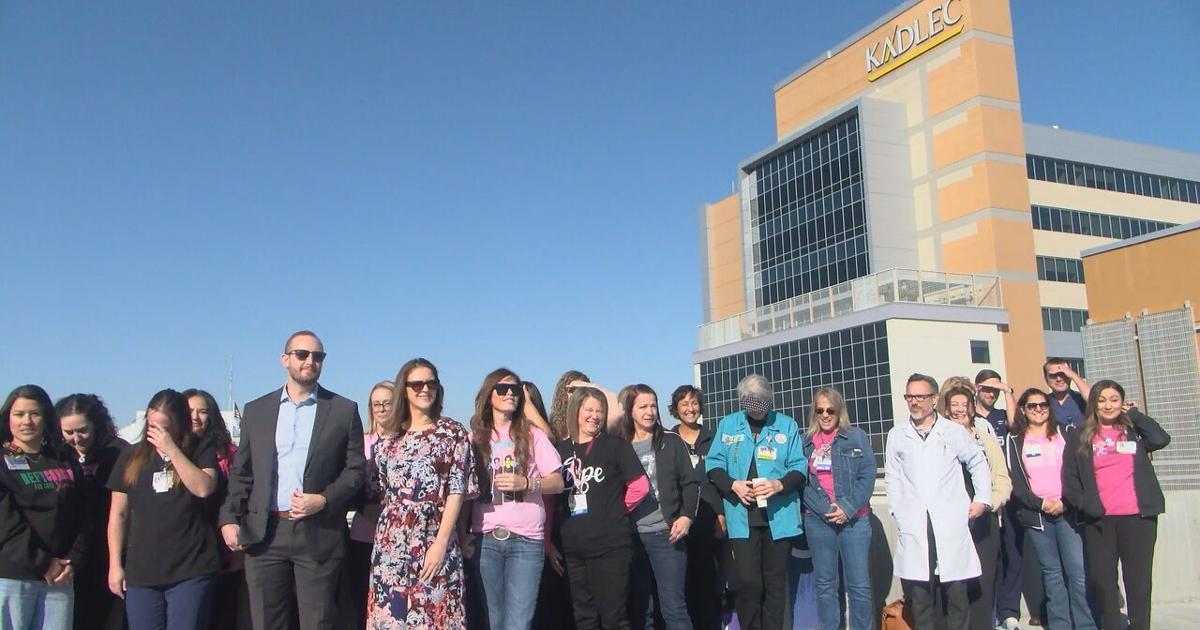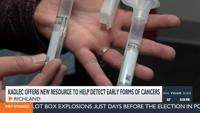The Brief
• Kadlec Regional Medical Center raised its annual pink flag for Breast Cancer Awareness Month, continuing a tradition of more than 20 years
• Women with harmful BRCA gene mutations have more than a 60% lifetime risk of developing breast cancer, compared to 13% in the general population
• Survivor Jenna Boogerd encourages early detection after her own two-and-a-half-year journey to diagnosis
RICHLAND, Wash. — A pink flag now flies above Kadlec Regional Medical Center as October marks Breast Cancer Awareness Month, honoring survivors and remembering lives lost while emphasizing the critical role of genetic testing in early detection.
The flag-raising ceremony continues a tradition spanning more than two decades at the Richland Medical Center, serving as both a symbol of hope and a call to action for early detection and awareness.
For breast cancer survivor Jenna Boogerd, the message resonates deeply after her own challenging path to diagnosis.
“I was diagnosed in April after a little over two and a half years of seeking help to figure out what was wrong and what this lump was that I had in my breast. It kept presenting as mastitis,” Boogerd said.
This year’s awareness campaign places particular emphasis on genetic testing, specifically for mutations in the BRCA genes, commonly known as the breast cancer genes. The statistics underscore the importance of this testing: more than 60% of women who inherit harmful changes in BRCA1 or BRCA2 will develop breast cancer during their lifetime, according to the National Cancer Institute. By contrast, about 13% of women in the general population will develop breast cancer.
Dr. Andrew Roehrig, a radiation oncologist at Kadlec Tri-Cities Cancer Center, explains how these genetic mutations can contribute to the development of cancer.
“Mutations in BRCA1 or BRCA2 can affect the DNA repair process, which means as our cells continue to grow and divide, our DNA is continuously replicated, and if that process isn’t repaired by a good enzyme, then cancer can form,” Roehrig said.
The risks extend beyond breast cancer. Women with BRCA1 mutations face a 39% to 58% lifetime risk of ovarian cancer, while those with BRCA2 mutations have a 13% to 29% risk. The general population’s ovarian cancer risk is just 1.1%.
BRCA testing can prove life-saving, particularly for families with histories of breast or ovarian cancer. Medical professionals recommend genetic counseling and testing for individuals with a specific family history that indicates a higher risk.
“If you had a sister who was diagnosed with breast cancer in her 40s or somebody with a particularly aggressive form of breast cancer, all of these are signs that a breast cancer mutation gene might be present in your family,” Roehrig said.
The strongest genetic links typically come from immediate family members, according to Roehrig. Risk factors that may warrant BRCA testing include having a family member with an inherited harmful change in BRCA genes, Ashkenazi Jewish heritage, or personal or family history of breast cancer at age 50 or younger, ovarian cancer, male breast cancer, pancreatic cancer, or high-risk prostate cancer.
BRCA testing involves a simple blood or saliva sample, with results typically available within several weeks. The test can yield three possible outcomes: positive (harmful mutation present), negative (no harmful mutation detected), or a variant of uncertain significance requiring further evaluation.
For Boogerd, understanding her risks and having medical support made a significant difference in her treatment journey.
“I’m still going through it. So I still have time here at Kadlec with Dr. Droesch and his team. I would encourage everyone to go get your mammogram, go get checked,” Boogerd said.
Kadlec leaders emphasize that the annual flag ceremony represents more than tradition. The event serves as a reminder that awareness, regular screenings, and genetic testing can help save lives through early detection.
The medical center offers comprehensive genetic counseling services through its Genetic Counseling Clinic, located at 900 Stevens Dr., Suite 204, in Richland, with an additional office in Kennewick. In 2024, Kadlec launched its “Prevention 4ME” program, which offers high-risk patients a questionnaire and saliva-based genetic test to assess risk for the 10 most common hereditary cancers.
For individuals with personal or family history indicating breast cancer risk over 20%, Kadlec’s high-risk breast screening program provides formal risk assessment, management plans, and recommended annual screenings, including mammograms and MRIs.
The need for proactive screening is underscored by state statistics. Washington had the ninth-highest breast cancer diagnosis rate in the nation between 2017 and 2021, according to the American Cancer Society. Despite this high diagnosis rate, Washington women aged 40 and older had one of the lowest mammogram screening rates in the country between 2021 and 2022.
Health insurance typically covers genetic counseling and testing for individuals who meet specific medical criteria. Some testing companies offer services at no charge to patients who lack insurance and meet financial and medical requirements.
As the pink flag waves above Kadlec Regional Medical Center throughout October, it carries a clear message: from family histories to genetic testing, understanding personal risk factors remains key to fighting breast cancer through early detection and prevention. Those interested in genetic counseling services can obtain a physician referral to begin the consultation process.
COPYRIGHT 2025 BY APPLE VALLEY NEWS NOW. ALL RIGHTS RESERVED. THIS MATERIAL MAY NOT BE PUBLISHED, BROADCAST, REWRITTEN OR REDISTRIBUTED.





